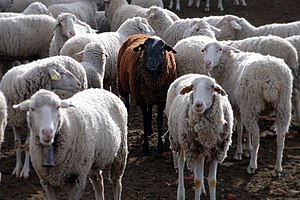Black sheep
From Wikipedia, the free encyclopedia
Jump to: navigation, searchFor other uses, see Black sheep (disambiguation). The Black Sheep, from a 1901 edition of Mother Goose by William Wallace Denslow.
The Black Sheep, from a 1901 edition of Mother Goose by William Wallace Denslow.In the English language, Black sheep is an idiom used to describe an odd or disreputable member of a group, especially within one's family. The term has typically been given negative implications, implying waywardness.[1] It derived from the atypical and unwanted presence of black individuals in herds of white sheep. The idiom is also found in other languages, e.g., French, Serbian, Bulgarian, Hebrew, Portuguese, Bosnian, Greek, Turkish, Dutch, Spanish, Czech, Romanian and Polish. There is an expression "white crow" ("белая ворона", "belaya vorona") in Russian.
Contents
[hide][edit] Idiomatic usage
The term originated from the occasional black sheep which are born into a herd of white sheep due to a genetic process of recessive traits. Black wool was considered commercially undesirable because it could not be dyed.[1] In 18th and 19th century England, the black color of the sheep was seen as the mark of the devil.[2] In modern usage, the expression has lost some of its negative connotations, and the term is usually given to the member of a group who has certain characteristics or lack thereof deemed undesirable by that group.[3]
A variant form, "the red sheep of the family", was used by Jessica Mitford to describe herself, a communist in a family of aristocratic fascists.[4]
[edit] Biological origin
In sheep, whiteness is not albinism but a dominant gene that actively switches color production off. As a result, sheep blackness is recessive, and if a white ram and a white ewe are parents of a black lamb, both must be heterozygous for black, and then there is a 25% chance that the lamb will be black. A recent study done by the Agricultural University of Norway, and the Vollum Institute of the Oregon Health Sciences University believe the black color is created by an allele E D at the extension locus.[5]
[edit] Other uses
In psychology, the "black sheep effect" refers to the tendency of an in-group to treat or evaluate a member of its own more harshly than a similarly negative behavior or deed of an out-group member.[6]
[edit] See also
Look up black sheep in Wiktionary, the free dictionary. [edit] References
- ^ a b Ammer, Christine (1997). American Heritage Dictionary of Idioms. Houghton Mifflin Harcourt. ISBN 9780395727744. http://books.google.com/?id=9re1vfFh04sC&pg=PA64&lpg=PA64&dq=american+heritage+dictionary+%22black+sheep%22. Retrieved 2007-11-13.
- ^ Sykes, Christopher Simon (1983). Black Sheep. New York: Viking Press. p. 11. ISBN 0670172766.
- ^ The American Heritage Dictionary of Idioms. Houghton Mifflin Company. 1992. http://www.answers.com/topic/black-sheep. Retrieved 2008-03-24.
- ^ "Red Sheep: How Jessica Mitford found her voice" by Thomas Mallon 16 Oct 2007 New Yorker
- ^ VåGe, Dag Inge; Dag Inge Våge, Helge Klungland, Dongsi Lu and Roger D. Cone (January, 1999). "Molecular and pharmacological characterization of dominant black coat color in sheep". Mammalian Genome (Springer New York) 10 (1): 39–43. doi:10.1007/s003359900939. ISSN [http://www.worldcat.org/issn/0938-8990 (Print) 1432-1777 (Online) 0938-8990 (Print) 1432-1777 (Online)]. PMID 9892731. http://www.springerlink.com/content/h800bru487qmhtck/. Retrieved 2008-03-31.
- ^ Black sheep effect Psychology Lexicon. Retrieved on January 4, 2008
[edit] External links
- [1] Exploration of the etymology of the phrase "black sheep of the family."
- "The black sheep effect: Judgmental extremity towards ingroup members in inter-and intra-group situations". European Journal of Social Psychology (Science Direct) 18 (3): 287–292. doi:10.1002/ejsp.2420180308. http://www.sciencedirect.com/science/journal/00221031. Retrieved 2008-01-04.
http://en.wikipedia.org/wiki/Black_sheep @trevorspeaks @icpchad @firetown @ElyssaD @VixenDaLuxe [definition can be edited] ;-)
file under: conspiracy; disambiguation [they even have a wiki for that]

Comments
Post a Comment